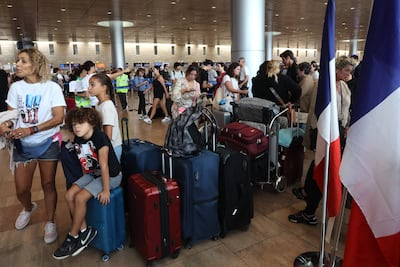Israel's currency is not expected to weaken “significantly further” amid support provided by the country’s central bank, analysts have said.
The shekel dropped to a near eight-year low against the US dollar on Monday morning after war broke out between Israel and Gaza. It was trading 0.15 per cent higher at 3.9764 against the greenback when markets closed on Friday.
“The Bank of Israel’s announcement this week that is ready to provide up to $30 billion of foreign exchange liquidity in the spot market and up to $15 billion in swaps, alongside the fact that the Israeli shekel was already undervalued prior to the conflict, signals to us that the currency is unlikely to weaken significantly further from current levels,” Ehsan Khoman, head of ESG, commodities and emerging markets research at MUFG told The National.
The Bank of Israel on Monday said it would carry out a sale of up to $30 billion in foreign exchange to support its currency.
The central bank “will operate in the market during the coming period in order to moderate volatility in the shekel exchange rate and to provide the necessary liquidity for the continued proper functioning of the markets”, the regulator said.
The move was expected to provide additional liquidity of up to $15 billion to the market.
The currency intervention came after war broke out between Israel and Hamas last on October 7.
Palestinian militant group Hamas launched an assault from Gaza, in which its gunmen killed at least 1,300 people in the worst attack on Israel yet.
Israel has since launched a bombing campaign against Hamas in the crowded enclave of Gaza before a possible ground invasion.
Hundreds of people from both sides have died due to the conflict. Israel ordered more than 1.1 million people in the north of Gaza to move south in 24 hours, as it prepared to launch a ground invasion of the territory.
The shekel has already been one of the worst performing currencies this year, down more than 12 per cent against the greenback as investors were concerned over the government’s move to overhaul the judiciary earlier this year.
“Intervention by the Bank of Israel may at best provide some short-term stability, however, this may not be sustainable,” said Krishnan Ramachandran, chief executive of Barjeel Geojit Financial Services.

“The US dollar-shekel is expected to hit 4.10 to 4.11 in the near term and can fall further if the conflict situation continues to escalate.”
Israel’s economy is also expected to be hit amid the continuing war with Hamas, analysts added.
“The biggest impact on the Israeli economy in the short term will be through consumer spending and tourism, with most international airlines suspending flights into the country,” said Scott Livermore, chief economist at Oxford Economics.
Emirates on Thursday cancelled all flights to Tel Aviv until October 20 amid the continuing war between Hamas and Israel. Other global airlines including British Airways and Virgin Atlantic also suspended flights to Israel’s capital.
“During the first year of the second intifada [from 2000 to the fourth quarter of 2001], the tourism sector was the most affected as employment dropped 7 per cent year-on-year due to inbound arrivals falling around 60 per cent year-on-year,” Mr Livermore said.
He added that, until the full response from Israel becomes clear, “the distribution of risks to the outlook remains wide.”
Israel's Tel Aviv share index, the TA-35, was down 0.73 per cent at the end of trading on Thursday.
“At face value, the conflict is predominantly a stagflationary shock, with supply-side disruptions due to higher fiscal expenditures while increasing reservists may weigh on labour market tightness,” Mr Khoman said.
“Israel’s fundamental balance of payments position is much healthier today than it has been during previous episodes of conflict, with the Bank of Israel accumulating a considerable quantum of reserves at around $200 billion.


